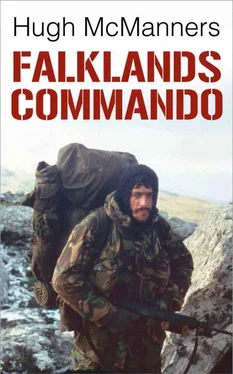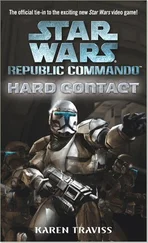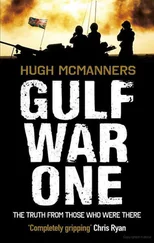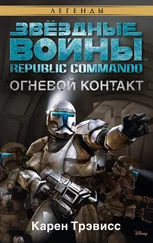Hugh McManners - Falklands Commando
Здесь есть возможность читать онлайн «Hugh McManners - Falklands Commando» весь текст электронной книги совершенно бесплатно (целиком полную версию без сокращений). В некоторых случаях можно слушать аудио, скачать через торрент в формате fb2 и присутствует краткое содержание. Город: London, Год выпуска: 2014, ISBN: 2014, Издательство: Nightstrike Publishing, Жанр: nonf_military, Биографии и Мемуары, на английском языке. Описание произведения, (предисловие) а так же отзывы посетителей доступны на портале библиотеки ЛибКат.
- Название:Falklands Commando
- Автор:
- Издательство:Nightstrike Publishing
- Жанр:
- Год:2014
- Город:London
- ISBN:978-0-992-81540-0
- Рейтинг книги:4 / 5. Голосов: 1
-
Избранное:Добавить в избранное
- Отзывы:
-
Ваша оценка:
- 80
- 1
- 2
- 3
- 4
- 5
Falklands Commando: краткое содержание, описание и аннотация
Предлагаем к чтению аннотацию, описание, краткое содержание или предисловие (зависит от того, что написал сам автор книги «Falklands Commando»). Если вы не нашли необходимую информацию о книге — напишите в комментариях, мы постараемся отыскать её.
Falklands Commando — читать онлайн бесплатно полную книгу (весь текст) целиком
Ниже представлен текст книги, разбитый по страницам. Система сохранения места последней прочитанной страницы, позволяет с удобством читать онлайн бесплатно книгу «Falklands Commando», без необходимости каждый раз заново искать на чём Вы остановились. Поставьте закладку, и сможете в любой момент перейти на страницу, на которой закончили чтение.
Интервал:
Закладка:
We put to sea two days before the rest of the Task Force, pulled from the jetty by dirty, bustling tugs into the centre of the Solent just opposite the QE2’ s berth, which was empty. We got under way slowly in the gathering dusk. The streetlights flicked on, white and orange dots of light across a blue-green, misty, spring evening. We nosed carefully down the channel past the river opening at Beaulieu, then the old Army mental hospital at Netley. With our sister Sir Lancelot ship astern, hooters sounding, echoing around the deserted shipyards and jetties, we were as fine a convoy as you could wish. A Ford Transit van and small saloon car hooted and flashed headlights. We waved back as the twilight deepened.
When the darkness made it impossible to see anything but the lights of the other ships and the lines of the quaysides, we melted away from the upper decks and went below to think about the open-ended ‘sentence’ of waiting that we were now starting. But, for some of those on that deck watching England slip away into the night, it had been their last glimpse of home.
Chapter 2. At Sea
For our first two days at sea TV reception was very good, which was not surprising as Sir Percivale sailed from Marchwood to just south of Isle of Wight, where we waited for everybody else.
Television news showed us the animated preparations in Portsmouth and Plymouth, the loading of the LPD HMS Fearless (standing for Landing Platform Dock, describing the large flight-deck on the stern and the rear-entry internal dock, which takes four large landing craft). Fearless was to be the amphibious operations centre from which all the war planning would emanate. The two aircraft carriers, HMS Hermes and the new HMS Invincible , were crawling with ant-like chains of matelots passing stores hand-to-hand up the gang-planks, everything from boxes of baked beans and barrels of beer to Sea Dart missiles.
As Sir Percivale jerked and rolled in the swell, we watched the City of Plymouth’s emotional farewell to HMS Fearless – ship’s company and embarked Commandos lining the rails, helicopters on deck. Fearless ’ landing-craft followed in her wake like ducklings chasing after their mother. Wives gathered at the best vantage points for last glimpses, holding up small children for farewell waves.
Only a few weeks earlier I’d been in Fearless , sailing back from Norway. There had been the same purple-blue hills, slate-grey houses, but only a drowsy bustle in Plymouth Sound, and the sullen faces of HM Customs officials on a go-slow. But now, the colour and almost desperate carnival atmosphere reminded me more of leaving Grand Harbour Valetta in Malta, than departing Plymouth in the spring.
The farewells to 3 Commando Brigade we were watching on the wardroom telly differed from those we were to see three weeks later, via video cassettes dropped by parachute, of the departure of 5 Brigade in the QE2. By then, it seemed certain we were going to have to fight.
But when Sir Percivale sailed, the Task Force represented merely a floating threat, the back-up for political negotiations, a diplomatic lever lending weight to the measured formulae of negotiation. Our departure also seemed to brighten the clouds of the economic recession. Later, once the sombre implications of the operation had become more apparent, the mood was different.
HMS Fearless , from her homeport of Plymouth, and HMS Hermes, HMS Invincible, and SS Canberra from Portsmouth-Southampton, all sailed to a blaze of media glory, stage-managed as the UK’s reaction to the Argentine invasion. Soldiers and sailors lined the decks, shoulder to shoulder; waving and cheering with various Royal Marine Bands playing jaunty regimental marches, pop tunes and the strangely haunting Rod Stewart song ‘I Am Sailing’. Fire tugs sent sprays of water high into the air and bunting fluttered.
But for us already at sea, the weather was taking a turn for the worse, and the sea mist obscured even the south coast of the Isle of Wight.
Most of us were well used to life on board ship, slipping into our own idiosyncratic routines, aimed at maintaining at least some privacy under crowded conditions, and to avoid the frustration that can turn into friction. For the officers, the ship’s focal point was the wardroom. Along with the ship’s officers, we ate in a small dining room and drank at the bar. They however, with their huge double-cabins and adjoining private bathrooms and loos, left the sitting-room part of the wardroom with its bench seats and tables to the ‘military officers’. We played board games: Scrabble and Diplomacy (the latter very topical) and read books from a small library shared with the rest of the ship.
We slept in small, four-bunk ‘Embarked Force Officers’ cabins, at the stern behind the wardroom proper with one 2-berth cabin for the Officer Commanding Troops, Major Gerry Akhurst. All were full, and our huge amount of kit blocked the passages – which was dangerous. So by mutual agreement, the one officers’ bathroom (for those who cannot bear the thought of taking showers) became a stowage space filled to the ceiling with sea bags, bergens, webbing and battered suitcases.
The ship was officered by Royal Fleet Auxiliary merchant seamen, bound by an extra clause in their contract enforcing participation in exploits like this. We saw very little of them, which wasn’t surprising as they worked the same watches all the time. Some were nocturnal, while others understandably preferred their large cabin sitting-rooms to the crowded wardroom.
The crew of Sir Percivale were Hong Kong Chinese. They lived in the same sort of accommodation as us, two decks below. Every morning a steward would come in with cups of revoltingly strong tea with added sugar and biscuits, performing an impressive balancing act over our bergens, sea kit bags, flying helmets, nav bags and suitcases. Although not actually drinkable, the tea’s arrival meant breakfast would be served in half an hour. We got up in relays to shave in our cabins’ single washbasin, before putting on lightweight camouflage trousers, shirt and desert boots. Desert boots are the polite thing to wear on ships – rubber-soled combat boots leave black streaks on decks that sailors have spent hours polishing.
Sir Percivale carried a variety of different military units: guns and gunners from two commando batteries, 7 (Sphinx) and my former gun battery 8 (Alma) – known as ‘Black Eight’, people from 45 Commando and its helicopter flight plus their three Gazelles, pilots, ground crew, fitters, marshallers, and spare parts. The flight commander was my cabin-mate Lieutenant Nick Pounds.
A Mexe Float Troop were permanently based on the ship – members of the Royal Corps of Transport (RCT) from Marchwood, who enjoyed the best cabins. I didn’t know where the word ‘Mexe’ comes from, [2](pronounced like Mexican but without the ‘can’), whereas the mexe floats themselves were huge metal pontoons that could be clipped together to form rafts along which lorries could drive. They had huge outboard tractor-type diesel motors to enable them to shuttle vehicles ashore, or so they could manoeuvre together to form a continuous ramp from the supply ships onto hard standing ashore. They’re essential for places with shelving beaches and no jetties.
The Mexe Float Troop, being self-consciously the old hands on board, enjoyed privileges, and acted studiously casual about the whole thing. There was also a defensive aspect to this, as they were not commando-trained. So although it was ‘their’ ship, we were unknown and probably rather challenging. Later on, the metal ‘Mexe’ Pontoons, which were carried strapped to the sides of the ship, became loose in a storm and on several occasions were very nearly ditched. When we arrived at Ascension, they worked very hard shifting cargoes around the fleet.
Читать дальшеИнтервал:
Закладка:
Похожие книги на «Falklands Commando»
Представляем Вашему вниманию похожие книги на «Falklands Commando» списком для выбора. Мы отобрали схожую по названию и смыслу литературу в надежде предоставить читателям больше вариантов отыскать новые, интересные, ещё непрочитанные произведения.
Обсуждение, отзывы о книге «Falklands Commando» и просто собственные мнения читателей. Оставьте ваши комментарии, напишите, что Вы думаете о произведении, его смысле или главных героях. Укажите что конкретно понравилось, а что нет, и почему Вы так считаете.












